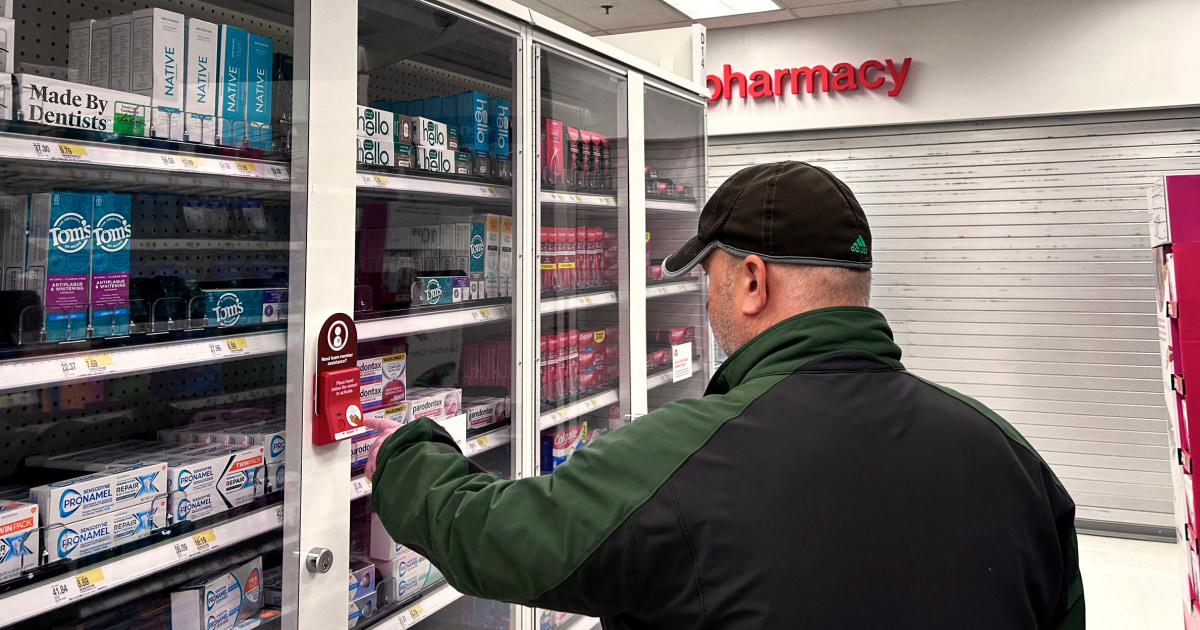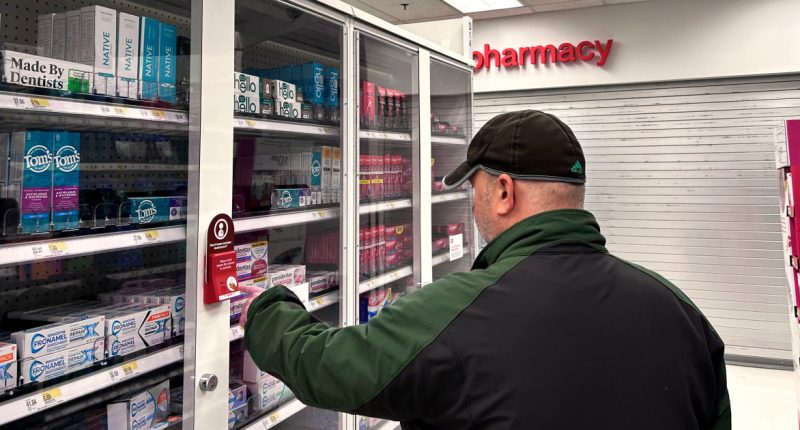
Americans are starting to feel like shoplifting is becoming an epidemic.
It’s becoming a mainstream worry that is contributing to fears about crime and the fate of major cities. New York City is experimenting with new ways to address shoplifting, for example, as complaints of stealing from retailers reportedly increased 77% from 2017 to 2022.
In October, former President Donald Trump said he would support shooting shoplifters, an indication that he sees those fears as a political asset.
To hear some retailers explain it, an outbreak of shoplifting, and especially “organized retail theft,” where merchandise is stolen en masse and resold online, is forcing them to close some stores and lock up merchandise elsewhere.
“We are living in a nation where stealing is no longer considered a crime, and those stealing are not criminals,” David Johnston, the vice president of asset protection and retail operations for the Washington, D.C.-based National Retail Federation, wrote in September.
But for all of the extreme statements, it’s hard to tell if there has really been a notable increase in shoplifting nationwide. Law enforcement often does not distinguish between theft from retailers and other kinds of robbery.
The broad category of larceny, however, is lower than it was before the pandemic. The Council on Criminal Justice, a nonpartisan think tank, says larceny fell 7% in the first half of 2023 compared to the same time period in 2019.
How retail theft ranks in the U.S.
Dylan Carden and Phillip Blee, two analysts for the financial services firm William Blair & Co., say that on a national level, it looks like theft and other forms of inventory loss — which retailers call “shrink” — are just returning to normal after they fell to unusually low levels in 2020 and 2021 because of the pandemic.
But what’s happening in individual cities can be very different from a national average, and the NRF has said its members are indeed reporting more theft. Along with other retailer groups, it spent the last couple of years focusing on organized retail theft specifically.
The group points to surveys of its members to show that theft is rising. That survey data can’t be easily verified, but even so, it shows the increase in overall theft has been less dramatic than the words the NRF is using to describe the situation.
Still, its lobbying efforts resulted in a federal law that requires online sales platforms to collect and disclose some sellers’ identities. This is meant to deter the sale of stolen goods online. Some states have passed similar laws.
Now, the NRF and other groups are backing a new law that would impose harsher sentences for theft and make it easier to bring federal theft charges. Retailers say that will deter thieves, but critics argue it’s reminiscent of the government’s 1970s-era approach to combating illegal drugs, the hallmark of which featured heavy-handed policing tactics that led to mass incarceration.
Journalists have pointed out that some of the stores being closed by companies like Target do not seem to be the same stores that have experienced the most shoplifting. On the other hand, not all shoplifting is reported, and the effects of an increase in theft could be complex.
Not enough workers and underperforming stores
There are other factors that could contribute to greater shrink. For one, stores have generally cut back on staff, which can create more opportunities for theft. They also discourage employees from getting involved when they see someone stealing.
There’s also the increasing prevalence of self-checkout kiosks, which also create an opportunity to steal — or might push law-abiding customers to give up on a malfunctioning scanner and walk out of the store.
Carden and Blee say that shoplifting, especially “organized” stealing of items that are later flipped online, seems to have increased somewhat. And they agree that retailers may not have a lot of options. Many of them are choosing to lock up merchandise even though it costs them sales when customers choose to shop elsewhere, or give up on trying to find an employee to retrieve the items they need.
Even with that in mind, they say there are indications that companies are overstating the problem, and that in some cases, they are doing so to distract from their own mistakes.
In a report published in October, Carden and Blee wrote that even though theft is “likely elevated,” retailers could be using that to pull attention away from recent internal struggles that have hurt their businesses, like inventory problems or an over-reliance on price cuts to boost sales.
“We also believe some more recent permanent store closures enacted under the cover of shrink relate to underperformance of these locations,” they said.
They added that company employees at distribution centers have more opportunities to steal merchandise than people inside stores, and those thefts are harder to trace — even though they are less dramatic than cellphone footage of “smash and grab” robberies.
“I don’t think you’ll ever hear a company tell you that employee theft is higher,” Blee told NBC News in an interview. He said stores rarely talk about that kind of theft because it makes them look like they’ve hired the wrong people and failed to keep track of their own merchandise.
Neil Saunders, the managing director at the consulting company GlobalData, told NBC News that theft has been growing, but store closures are rarely the result of theft alone, no matter what retailers may say. And because companies don’t disclose many details around shrink, there is speculation that they use it to cover for their own errors.
“In some ways, theft is a great excuse as it absolves a retailer of any responsibility as theft is somewhat outside of their control,” Saunders wrote in an email. “I don’t think anyone denies the problem of theft, it’s just that a lot more transparency and nuance is needed in the discussion.”
Source: | This article originally belongs to Nbcnews.com










